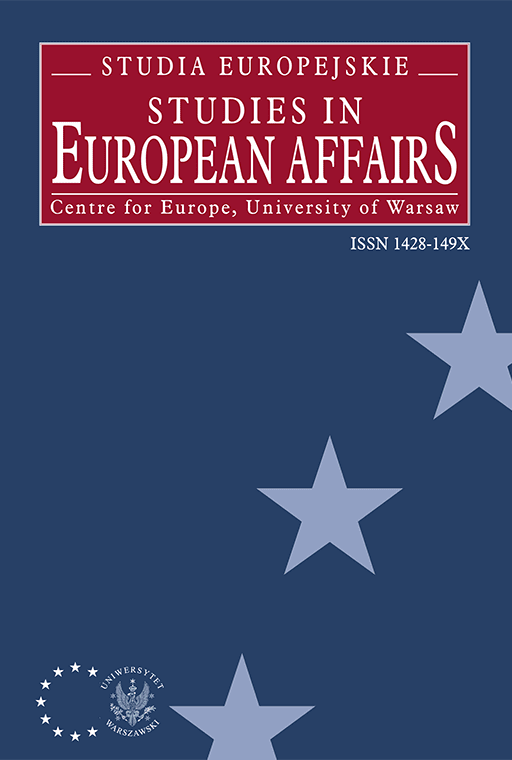
ISSUE: 1/2012
- Volume 61
- Number 1
- 2012
Subscribe NEWSLETTER
Studia Europejskie –
Studies in European Affairs
ISSN: 1428-149X
e-ISSN: 2719-3780
License
Articles published in the journal are under a Creative Commons Attribution – Non Commercial – No Derivatives 4.0 International License
Trudne początki… autorskie rozterki dotyczące studiów europejskich i antropologii nowej Europy (Refleksje po 20 latach funkcjonowania Centrum Europejskiego Uniwersytetu Warszawskiego)
Difficult Beginnings... Author’s Dilemmas Concerning the European Studies and the Anthropology of the New Europe (Reflections After 20 Years of the Centre for Europe, University of Warsaw)
Abstract
Already in the 1980s, the academic circles – as if predicting the changes about to happen and supported by more radical freedom movements – were studying European affairs in various centres and in various forms. In 1985, a team of professors from the University of Warsaw put forward a proposal of studies on European culture under the so-called ‘ministry problem’. Initially, the project entitled ‘Foundations of European Culture’ was rejected by the ministry’s team of experts evaluating the projects. However, already in 1987, the European Forum dedicated to culture was held in Budapest. Poland was represented by, among others, Aleksander Gieysztor. Culture proved to be a politically important sphere. Therefore General Jaruzelski, who was at that time attempting to improve his image in the world, gave the green light for culture and, indirectly, for the research proposed by the institute. This research corresponded to various other initiatives aimed at bringing Poland closer to the West. In the field of social sciences, one of the most important initiatives was
the appointment of the ‘One Europe’ group by the Congress of Sociology in Madrid. Some of the organisers of this group (J. Jerschina from the Jagiellonian University) took up co-operation with the University of Warsaw. This proved that the interest in European affairs was growing. The 21st century brings new questions. What about multiculturality? Is Europe still Christian? What about the re-emerging nationalism and protection of particular interests, what about the third culture – international finance, large corporations and media of worldwide coverage? As it came out, we are dealing with an extremely changeable subject of study and, at the same time, with constantly changing methods and techniques of academic work. European studies made us face a new and tough challenge which is as current now as it was in 1992.
Language: Polish
Pages: 11-20
How to Cite:
Harvard
Sokolewicz, Z. (2012) "Trudne początki… autorskie rozterki dotyczące studiów europejskich i antropologii nowej Europy (Refleksje po 20 latach funkcjonowania Centrum Europejskiego Uniwersytetu Warszawskiego)". Studia Europejskie – Studies in European Affairs, 1/2012, pp. 11-20.